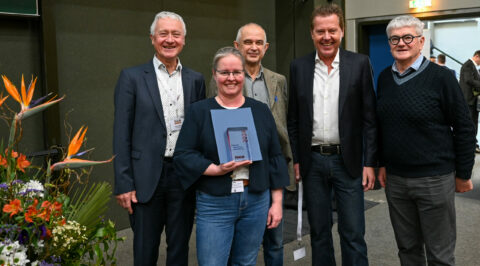DGAUM Innovation Prize 2024
As part of its annual conference in Munich, the German Society for Occupational and Environmental Medicine (Deutsche Gesellschaft für Arbeitsmedizin und Umweltmedizin, DGAUM) awarded the 2024 Innovation Prize to the BK 1301 Matrix Group for their publication “Work-related bladder carcinoma – The BK 1301 matrix as an algorithm and decision-making aid in the context of assessing occupational diseases”. PD Dr. med. Wobbeke Weistenhöfer of IPASUM in Erlangen accepted the award from President Prof. Dr. med. Thomas Kraus on behalf of the group. The BK 1301 Matrix Group further includes Prof. Dr. med. Klaus Golka (IfADo, Dortmund), Prof. Dr. med. Ulrich Bolm-Audorff (IPAS, Dresden), Prof. Dr. Dr. med. Hermann M. Bolt (IfADo, Dortmund), Prof. Dr. med. Thomas Brüning (IPA, Bochum), Prof. Dr. med. Ernst Hallier (IASUM, Göttingen), Dr. med. Dirk Pallapies (IPA, Bochum), Dr. med. Dipl.-Chem. Hans-Martin Prager (Arbeitsmedizin, Lünen), Dr. med. Teresa Schilling (IPASUM, Erlangen), Prof. Dr. med. Simone Schmitz-Spanke (IPASUM, Erlangen), Prof. Dr. med. Wolfgang Uter (IMBE, Erlangen), Dr. rer. nat. Tobias Weiß (IPA, Bochum) und Prof. Dr. med. Hans Drexler (IPASUM, Erlangen). The working group was formed following a DGAUM online workshop with 230 participants as part of the FB 286 project on the “Development of exposure risk assessment for the risk of bladder cancer from aromatic amines and assessment of the impact of bladder cancer on employment,” funded by the German Social Accident Insurance (Deutsche Gesetzliche Unfallversicherung, DGUV).
The BK 1301 matrix provides an overview of relevant aspects of occupational bladder cancer such as the duration, frequency, and intensity of exposure as well as age of onset, latency period, and concurrent non-occupational factors like smoking behaviour; moreover, the matrix evaluates these factors with regard to the assessment of the causal relationship in relation to a BK 1301 diagnosis and is thus an important decision-making tool for contextual assessments.
Since 2006, the DGAUM Innovation Prize has been awarded to individuals, groups, and institutions who have made a significant contribution to the development of the field through innovative achievements in research and education.
Parallel publication in MedSach 2022; 118 (2): 79–93
